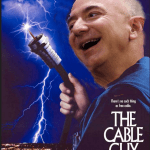 Now that an FCC ruling has paved the way for third parties to become provisioners of cable television programming packages, the largest cable provider in the land has decided to team up with the largest e-commerce provider in cyberspace.
Now that an FCC ruling has paved the way for third parties to become provisioners of cable television programming packages, the largest cable provider in the land has decided to team up with the largest e-commerce provider in cyberspace.
Amazon’s new Cable Store comes Comcast cable-ready — with TV only, TV plus Internet, or “Triple-play” TV, Internet and telephone services. However, a modem is not included in the packages and installation must be performed by the cable company.
Ironically, while Amazon customers can now arrange Comcast programming and upgrades including basic services and premium channels like HBO, Amazon’s own Prime TV package of movies and TV shows can be a smart alternative to Comcast programming, allowing “cord-cutters” to get by on fast Internet speeds and Amazon devices like the FireTV stick that let viewers enjoy Netflix, Hulu Plus and more — sans Comcast — plus the Amazon Prime line-up.
The pairing is also odd seeing that “the cable companies aren’t carrying Amazon video apps on their boxes (yet),” added Engadget.
Comcast’s play seems to be designed to be the first-mover, perhaps to box out other competitors. While it lauds Amazon’s customer service, actual phone support will come from a dedicated team at Comcast Call Centers in Spokane, WA and Tucson, AZ.
“Amazon is not only the biggest online retailer and a place where millions of our customers shop every day, but it’s also a brand that’s unrivaled when it comes to customer service,” Comcast executive Charlie Herrin said.
According to TVPredictions.com, “The Amazon offering would allow customers to purchase TV programming bundles in a slightly different way. The package would start with a ‘pre-bundled’ lineup of local broadcast channels and a set number of base channels. Then, consumers would pick a plan based on their budget and four different categories: Specialty Channels: Family Channels; Sports Channels; and Premium Entertainment.“
In past commentary, Comcast has argued against more set-top boxes for viewing content, depicting it as a move away from the future, and that the $1.6 billion energy cost is a microcosm of the policy’s flawed nature.
The Philadelphia-based juggernaut has also argued that its ability to upgrade its apps would be majorly hampered for customers consuming its content through third-party set-top boxes. [24×7]


















